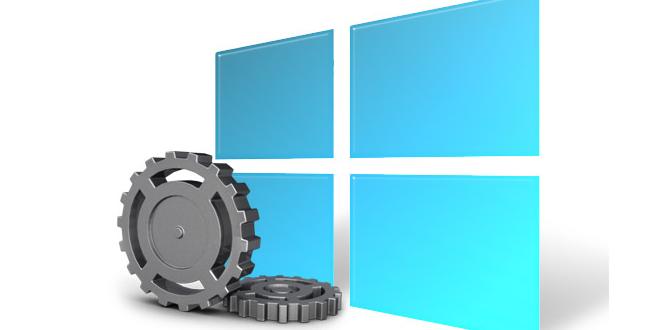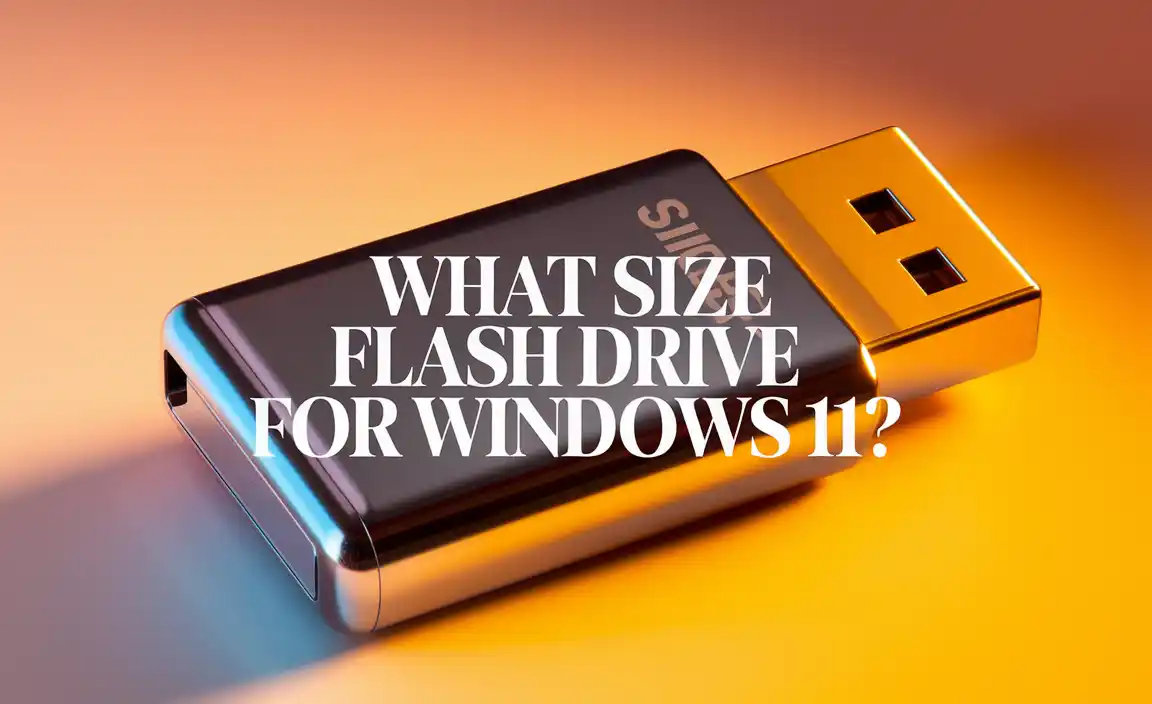Are you thinking about upgrading your computer to Windows 11? One of the first things you might consider is the right SSD size. Choosing the right SSD size for Windows 11 is very important. It can change how your computer runs and how much stuff you can store on it.
Imagine trying to play your favorite games or watch exciting movies but running out of space. That can be frustrating! Did you know that a larger SSD can make your computer run faster? This means quicker load times and a smoother experience. But how do you know what size is best for you?
In this article, we’ll explore the best SSD sizes for Windows 11. We’ll help you understand what you need based on how you use your computer. Whether you’re a gamer, a student, or just love browsing the web, there’s something here for everyone. Get ready to find the perfect SSD size that fits your needs!
Choosing The Right Ssd Size For Windows 11 Performance

SSD Size for Windows 11

Choosing the right SSD size for Windows 11 is crucial. The minimum recommendation is 64 GB, but many users need 256 GB or more for smoother performance. Have you ever struggled with storage limits? A larger SSD helps keep your files and apps in one place. Surprisingly, a 512 GB drive is often considered ideal for gamers and multitaskers. Investing in a bigger SSD can transform your Windows 11 experience into something fast and efficient.
Understanding SSD Sizes

Different sizes of SSDs: 128GB, 256GB, 512GB, 1TB, etc.. Factors influencing SSD size decision.
There are different SSD sizes, like 128GB, 256GB, 512GB, and 1TB. Picking the right size depends on how you use your computer. Do you download many movies? Choose a bigger SSD! Want to play games and keep your files? A 512GB might be your best friend. Remember, it’s like picking the right sized pizza: don’t go too small or you’ll be hungry later.
| SSD Size | Best For |
|---|---|
| 128GB | Basic tasks, small files |
| 256GB | Casual users, some games |
| 512GB | Gamers, many programs |
| 1TB | Heavy users, lots of storage |
So, think about what you need! Don’t forget to look into price and performance too. A bigger SSD means more space, but it might cost a bit more. Choose wisely! After all, nobody wants to run out of storage while watching cat videos!
Windows 11 System Requirements

Minimum and recommended storage requirements for Windows 11. Impact of SSD size on performance and functionality.
Windows 11 has specific storage needs. The minimum required size is 64 GB. But for smooth operation, it’s better to have at least 128 GB or more. A bigger SSD size can improve performance. It helps your computer run faster and store more games, apps, and files. Users with larger SSDs enjoy quicker startup times and smoother multitasking.
- **Minimum requirement:** 64 GB
- **Recommended:** 128 GB or more
What are the impacts of SSD size on performance?
A larger SSD can enhance speed and efficiency. It allows more space for updates and applications, leading to a better user experience. This means games load faster and files save quickly, making everything feel snappy.
Benefits of Larger SSD Sizes

Increased storage capacity and its advantages. Futureproofing your system for software updates and new applications.
A larger SSD size means more space for your favorite games, photos, and videos. Imagine not worrying about which cute cat video to delete! More storage capacity lets you keep everything you love right at your fingertips. Plus, a big SSD helps your computer run smoothly as new software updates pop up. You don’t want to miss out on the latest apps that could make your life easier. So, think of it as a way to future-proof your system—like wearing a helmet while biking! Safety first!
| SSD Size | Storage Capacity | New App Compatibility |
|---|---|---|
| 256 GB | Limited | Okay |
| 512 GB | More Space | Good |
| 1 TB | Plenty! | Excellent |
Assessing Storage Needs for Users
Distinguishing between casual users, gamers, and professionals. Usage scenarios: document storage, gaming, media production.
Choosing the right SSD size for Windows 11 depends on how you use your computer. Casual users, like those who check email or browse the web, might only need 256GB. Gamers, however, usually require more space to hold their favorite titles, often settling for 512GB or even 1TB. Professionals, especially in media production, often need at least 1TB to store large files. Remember, the more you store, the more you need!
| User Type | SSD Size |
|---|---|
| Casual Users | 256GB |
| Gamers | 512GB – 1TB |
| Professionals | 1TB or more |
So, pick wisely! Nobody wants to run out of space and start deleting grandma’s photos, right? (Talk about a family feud!)
Cost Considerations for Different SSD Sizes
Price per GB for various SSD sizes. Budgeting effectively for your storage needs.
Buying an SSD can be tricky, especially with so many sizes and prices. Generally, larger SSDs cost less per gigabyte (GB). For example:
- 500GB SSD: $0.10/GB
- 1TB SSD: $0.08/GB
- 2TB SSD: $0.07/GB
When budgeting, think about how much storage you really need. Do you store many games or videos? A bigger SSD can save you money in the long run. Choose wisely to fit your budget and needs!
What is the best SSD size for Windows 11?
For Windows 11, a 500GB SSD is a good start. It offers space for the OS and some apps. If you use many programs, consider 1TB.
Comparing SSD Types and Their Sizes
Differences between SATA, NVMe, and M.2 SSDs. How size and type affect overall performance.
Different SSD types can feel like a snack aisle—many choices! SATA SSDs are slower, like a tortoise in a race. They’re good if you want something simple. NVMe SSDs? They zoom like a cheetah! They offer speedy data transfer and are perfect for gaming. M.2 SSDs add versatility—like a Swiss Army knife. Their size varies, and faster types boost your computer’s performance. Choose wisely!
| SSD Type | Speed | Size |
|---|---|---|
| SATA | Slow | 2.5-inch |
| NVMe | Fast | Small |
| M.2 | Varies | Super small |
Upgrading and Expanding SSD Storage
Options for upgrading existing SSDs. How to utilize external SSDs for additional storage.
Upgrading your SSD can boost your computer’s speed and storage. You can upgrade your existing SSD by replacing it with a larger one. Ensure your laptop or desktop supports this. External SSDs are another great option. They connect via USB and provide extra space. Here’s how to upgrade:
- Check if your current SSD is removable.
- Buy a compatible SSD of a larger size.
- Clone your data to the new SSD.
- For external SSDs, connect and format them for your system.
Can I upgrade my SSD for Windows 11?
Yes, you can upgrade your SSD to improve performance for Windows 11.
What are the benefits of external SSDs?
External SSDs offer added storage, portability, and faster data transfer rates.
Migrating to Windows 11: Storage Tips
Preparing current storage before upgrading. Best practices for data migration to new SSDs.
Before you embrace Windows 11, it’s wise to give your current storage a little TLC. Start by cleaning out old files and applications. Think of it as spring cleaning, but for your computer! Consider upgrading to a larger SSD for better performance. Did you know that users enjoy faster load times and smoother multitasking? It’s like upgrading from a skateboard to a rocket ship!
| Tip | Details |
|---|---|
| Clean Up | Delete unnecessary files and apps. |
| Backup Data | Use external drives or cloud storage for safety. |
| Choose the Right SSD Size | At least 256GB is a great start for Windows 11. |
Once that’s done, transferring your data is a breeze. Just follow the best practices, and your computer will thank you. Remember, data migration is like moving houses; pack your essentials and leave behind what you don’t need. Happy upgrading!
Conclusion
In conclusion, choosing the right SSD size for Windows 11 is important for performance and storage needs. A minimum of 256GB is recommended, but 512GB or more is even better. This ensures you have enough space for apps and files. You can explore different options to find what suits you best. Consider upgrading your SSD today for a faster experience!
FAQs
What Is The Minimum Ssd Size Required To Install Windows Effectively?
To install Windows well, you need at least a 64 gigabyte (GB) solid-state drive (SSD). This size helps the computer run faster and store programs. If you want to save more games and files, a bigger SSD, like 256 GB, is better. A larger SSD gives you more space for everything you enjoy!
How Much Storage Space Should I Allocate For Applications And Files On My Ssd When Using Windows 1
You should think about what you need for your applications and files. If you play games or use big programs, set aside more space, like 256GB or more. For schoolwork and simple apps, 128GB might be enough. Always leave some extra space for updates and new files. It’s better to have a little more than you think you’ll need!
Are There Benefits To Using A Larger Ssd For Windows Compared To The Minimum Size Requirement?
Yes, there are benefits to using a larger Solid State Drive (SSD) for Windows. A bigger SSD gives you more space for games, apps, and files. This means your computer runs faster and won’t fill up as quickly. Plus, you can store more things without worrying about space. It’s like having a bigger toy box for all your favorite toys!
Can I Run Windows On An Ssd Smaller Than The Recommended Size, And What Issues Might Arise?
Yes, you can run Windows on a smaller SSD (Solid State Drive). However, you might run into problems. For example, there may not be enough space for updates or extra programs. This could make your computer slow or stop working properly. It’s best to use an SSD that meets the recommended size for better performance.
What Are The Advantages Of Nvme Ssds Over Sata Ssds For Optimal Windows Performance?
NVMe SSDs are faster than SATA SSDs. This means your computer starts quickly and loads games or apps faster. You can do more things at once without slowing down. If you want a smooth gaming or working experience, NVMe SSDs are better. They make your Windows feel snappier and more fun to use.








